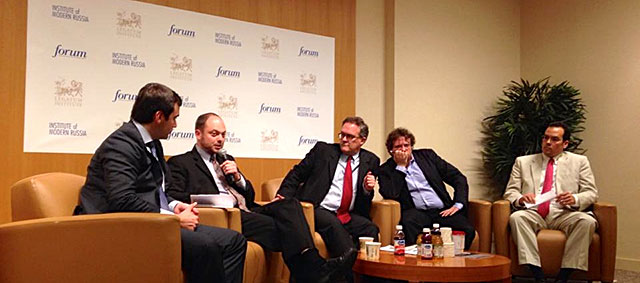On October 15, prominent experts and politicians gathered in Washington DC to discuss recent political developments in Russia. The discussion was based on British researcher Peter Pomerantsev’s paper “Russia: A Postmodern Dictatorship.” The event was co-sponsored by the Institute of Modern Russia, the Legatum Institute, and the National Endowment for Democracy.

The panel included Pavel Khodorkovsky, president of the Institute of Modern Russia; Vladimir Kara-Murza, member of the Federal Council of the Republican Party of Russia–People’s Freedom Party; Peter Pomerantsev, British journalist and researcher; and Christopher Walker, executive director of the International Forum for Democratic Studies at the National Endowment for Democracy (NED). Christian Caryl, editor of Democracy Lab and senior fellow at the Legatum Institute, moderated.
In his introductory remarks, NED President Carl Gershman spoke of the major flaws of the repressive Russian regime, which Peter Pomerantsev described in his paper as a “postmodern dictatorship.” In Gershman’s opinion, this regime has no future, given the current scale of corruption, the poor state of affairs in the social sphere and the economy, and Putin’s imperial ambitions. He also mentioned the upcoming tenth anniversary of Mikhail Khodorkovsky’s arrest and expressed confidence that, with time, the whole truth about this event will come to light.
“Yes, the judiciary is subject to the state, there is great bureaucracy, pluralism is discouraged, business is intimidated. But at the same time many people have started to react. There is a new generation of citizens who are ready to fight for their rights.”
Pavel Khodorkovsky said that for the last ten years, he has been viewing the process of change in Russia through the eyes of his father, who spent this decade in prison: “We see the new order in today’s Russia. Yes, the judiciary is subject to the state, there is great bureaucracy, pluralism is discouraged, business is intimidated. But at the same time, as we saw in 2011, many people have started to react. There is a new generation of citizens in the country who are ready to fight for their rights.”
Peter Pomerantsev elaborated on the reasons for naming the Russian political system a “postmodern dictatorship.” In his opinion, there is a new generation of dictatorships in the world that imitate democratic processes. These regimes, like the ones in Syria, Venezuela, and Russia, learn from each other and support each other. Pomerantsev gave the example of Russia’s Snob media group, launched by the billionaire Mikhail Prokhorov. According to Pomerantsev, this project was conceived by Kremlin spin doctors to give the liberal public an illusion of real discourse, while simultaneously separating liberal intellectuals from the masses and infusing their images with what “average Russians hated the most”—“snobbish” conversations about a luxurious lifestyle.
Vladimir Kara-Murza focused on the regime’s founding myth that there is no alternative to Putin. According to the People’s Freedom Party representative, in the last two years, this myth has received two major blows. The first one was the unprecedented mass protests of December 2011, when more than 100,000 people came out into the streets to protest the rigged parliamentary elections. The second blow came a few weeks ago at the Moscow mayoral election, when the opposition candidate Alexei Navalny, who was being charged in five criminal cases and had no access to national TV networks, received nearly 30 percent of the vote. The regime had always claimed that there was no real opposition in Russia, that its critics were “marginal and nobodies,” but recent developments have proven otherwise.
Christopher Walker pointed out that Putin’s regime, like many other “postmodern dictatorships,” still cares about democratic legitimacy: “Mass media in Russia are managed rather than controlled. The amount of managing in the electoral process is also remarkable, while the veneer of democracy is also very important.” He also mentioned the recent situation in Syria, in which the Russian authorities have used international law as a false argument to pursue their own agenda.
The full video recording of the event is available here.

